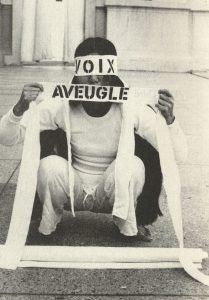In This Bridge Called My Back, the photo Aveugle Voix (Blind Voice), a 1975 photograph by Theresa Hak Kyung Cha, is found in the section titled “Speaking in Tongues: The Third World Woman Writer.” This section examines language and the power of Third World women’s writing. The Oxford English Dictionary defines the term Third World as “the countries of the world, esp. those of Africa and Asia, which are aligned with neither the Communist nor the non-Communist bloc; hence, the underdeveloped or poorer countries of the world, usually those of Africa, Asia, and Latin America.” Although this term is not as frequently used now, second wave feminists often used this term to describe women of color in America. The use of this term highlights how the solidarity of this community transcends borders because the oppression faced by women of color was not confined to America.
In the introduction to this section, Gloria Anzaldúa unites Third World women writers through her claim that “in [their] common struggle and in [their] writing [they] reclaim [their] tongues” (161). This photo is from a series that captures Cha’s performance art of the same name. The performance illuminates some of the struggles, such as a language barrier, Cha faced when her family immigrated to the U.S. from South Korea in 1962 (University of California Berkeley Art Museum). In contrast to Jo Carillo’s poem, “And When You Leave, Take Your Pictures With You,” which illustrates how white women misrepresented women of color, Cha’s photo demonstrates the reclaiming of voice as she is able to produce her own photo as a woman of color.

Theresa Hak Kyung Cha, Aveugle Voix (Blind Voice), 1975
In the photo, Cha is choosing to silence herself, exhibiting a form of agency that she had previously been denied. Cha represents her silence literally by placing the words Aveugle Voix across her face and eyes, symbolically taking away both her identity and her voice. But the words are reversed: the word “aveugle” (“blind”) covers her mouth and “voix” (“voice”) covers her eyes. In swapping these words, Cha explores the interconnectedness of one’s voice and sight. Cha is seen squatting and appears to be placing these coverings on herself. Although this position may evoke images of restraint and potentially bondage, it can signal newfound agency, as well. Even though Cha is silenced in this photo, her centrality forces the audience to pay attention and to listen to her. Cha’s work evokes the anxiety of losing one’s voice and the inability to communicate the violence and oppression one faces. Her own art allows her to be an agent rather than just a victim.
Cha’s photo is an example of power restoration for this community because she is illustrating the reclamation of her voice, something that was taken away from her by the dominant society. Aveugle Voix combats the belief that women of color are incapable of producing works that reflect their experiences and reclaims a form of power that has previously been denied to these communities. Anzaldúa’s “Speaking in Tongues: A Letter To Third World Women Writers” is located right after the photo in this section of the anthology and is a written piece that captures Cha’s visual representation of the silencing she endured.
 In this letter, Anzaldúa explores her thought process when she writes and recognizes the conditioning she has endured that has discouraged her from writing. As a Third World woman, she had been taught that her speech is inaudible and that this community “speak[s] in tongues like the outcast and the insane” (163). Anzaldúa acknowledges a recurring voice in her that poses this question to her: “Who am I, a poor Chicanita from the sticks, to think I could write?” (164). Through creation, Third World women are defying the beliefs that they are incapable of doing so, a form of power in itself.
In this letter, Anzaldúa explores her thought process when she writes and recognizes the conditioning she has endured that has discouraged her from writing. As a Third World woman, she had been taught that her speech is inaudible and that this community “speak[s] in tongues like the outcast and the insane” (163). Anzaldúa acknowledges a recurring voice in her that poses this question to her: “Who am I, a poor Chicanita from the sticks, to think I could write?” (164). Through creation, Third World women are defying the beliefs that they are incapable of doing so, a form of power in itself.
Sources:
Anzaldúa, Gloria. “Speaking in Tongues: A Letter To Third World Women Writers.” This Bridge Called My Back, edited by Cherríe Moraga and Gloria Anzaldúa, 4th ed., State U of New York P, 2015, pp. 163-172.
Cha, Theresa Hak Kyung. Aveugle Voix. 1975. This Bridge Called My Back: Writings by Radical Women of Color, edited by Cherríe Moraga, 4th ed., State U of New York P, 2015, p. 160.
“Theresa Hak Kyung Cha.” University of California Berkeley Art Museum, archive.bampfa.berkeley.edu/art/AN0230. Accessed 4 Dec. 2019.
“Third World | third world, n. (and adj.).” OED Online, Oxford University Press, September 2019, www.oed.com/view/Entry/200854. Accessed 20 November 2019.
